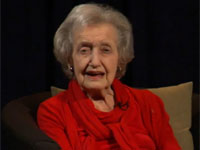Evoking Emotion in the Lab
At the 24th APS Annual Convention, Iris Mauss will host a workshop called Studying Emotions in the Laboratory. Mauss is an assistant professor of psychology at the University of California, Berkeley. Her own emotion research focuses on emotion regulation and how emotion regulation affects wellbeing. She has given the Observer a preview of what she will cover in her workshop.

Iris Mauss
What methods for studying emotion are you going to discuss in your workshop?
For inducing emotion, we will discuss advantages and disadvantages of various approaches, including pictures, film clips, and naturalistic interactions. For measuring emotion, we will cover advantages and disadvantages of three common measures: experience, facial behavior, and autonomic physiology. From within this wide range of methods, the workshop will focus on those of particular interest to workshop attendees.
How can researchers measure emotional responses empirically? Can you give an example of the standards you use for your own research?
This is a very complex, big, and tricky question that relates to the larger question of what an emotion is. Briefly, researchers often take a multi-method approach to measure the intensity of participants’ emotions. In the workshop, we will focus on three common approaches to doing so: experience sampling (e.g., asking participants how much anger they felt), coding facial behavior (e.g., coding from videotapes the intensity of facial expressions of anger), and measuring autonomic physiology (e.g., measuring participants’ blood pressure).
What are some challenges researchers encounter while studying emotion in the lab?
There are two major questions that researchers who want to study emotions in the laboratory are faced with. First, how can scientists ethically make participants emotional (evoke emotions such as sadness, happiness, or anger) in the laboratory? And second, how can scientists measure whether an emotion has occurred and how intense the emotion was? Basically, the whole workshop will deal with how to overcome these challenges, and we will talk about various ways to address these challenges as well as the advantages and disadvantages of each approach.
Why should convention attendees come to your workshop? What can they expect to take away from your presentation?
I think conference attendees who would benefit from this workshop are those who seek a brief and practical introduction to studying emotions in the laboratory. Attendees should emerge from the workshop with the ability to begin to design rigorous laboratory studies involving emotion.




APS regularly opens certain online articles for discussion on our website. Effective February 2021, you must be a logged-in APS member to post comments. By posting a comment, you agree to our Community Guidelines and the display of your profile information, including your name and affiliation. Any opinions, findings, conclusions, or recommendations present in article comments are those of the writers and do not necessarily reflect the views of APS or the article’s author. For more information, please see our Community Guidelines.
Please login with your APS account to comment.